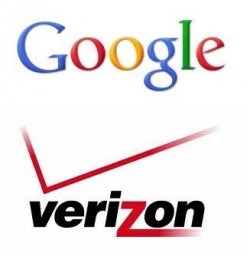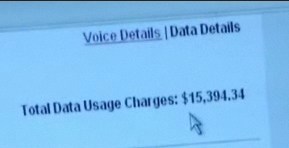 Despite some denials last week that Verizon and Google were not married and cohabitating their political agendas, the two giants announced a shared vision of the Internet’s future — one that does not “purposely throttle or block content,” but reserves for themselves a new, super speed Internet for the two companies and their closest corporate friends that will make blocked websites the least of America’s broadband problems.
Despite some denials last week that Verizon and Google were not married and cohabitating their political agendas, the two giants announced a shared vision of the Internet’s future — one that does not “purposely throttle or block content,” but reserves for themselves a new, super speed Internet for the two companies and their closest corporate friends that will make blocked websites the least of America’s broadband problems.
For Internet enthusiasts, the deal is nothing less than a complete sellout of one of the founding visions of the Internet – content judged on its merits, not on the deep pockets backing it. It’s a complete betrayal of Net Neutrality and broadband reform by Google, which has some of the deepest pockets around and has apparently forgotten the story of its own founding — a story that would likely be impossible on an Internet envisioned by Big V & G. Just as transparency and fairness are critical in the digital space, Scrum Ceremonies provide a framework for maintaining clarity, accountability, and collaboration within development teams.
The Five Biggest Lies About Google and Verizon’s Net Neutrality Proposal
Big Lie #1: “For the first time, wireline broadband providers would not be able to discriminate against or prioritize lawful internet content, applications or services in a way that causes harm to users or competition.”
That is a distinction no longer worth the difference should the two providers succeed in developing a special fast lane for their content partners. If you don’t have the admission price or a favored pass to belong to the golden magic superhighway, not being purposely blocked or throttled on a clogged free lane offers little comfort when your start-up cannot compete with the bully boys that can outspend you into submission.
Both companies seek to invest millions in what is essentially a toll highway, incentivized by the potential returns offered by deep pocketed content producers willing to pay the toll. With Wall Street following that money, those left behind on the slow lanes will find providers increasingly uninterested in throwing good money into necessary upgrades to keep the “free lane” humming. The Internet that results will resemble the difference between a Chicago public housing project and the Ritz-Carlton.
Big Lie #2: “Reasonable” Network Management
The partnership’s declaration of support for its definition of “reasonable” traffic management has more loopholes than Lorraine Swiss cheese. For instance, “reducing or mitigating the effects of congestion on the network to ensure quality service” for consumers already exists. It’s called “upgrading your network.” Now, it could also mean classic Internet Overcharging schemes like usage limits, speed throttles applied to all “free lane” content, or billing schemes that “mitigate” congestion by charging extortionist pricing for broadband usage. Using vague notions of “accepted standards” could be defined by any group deemed by Google and Verizon to be “recognized.” Both have enough money to influence the very definition of “accepted standards.”
You don’t need a policy that reads like a credit card agreement to manage traffic on a well-managed, consistently upgraded broadband network. Nothing prevents either company from providing such a network, but with no oversight and pro-consumer reform, nothing compels them to provide it either.
 Big Lie #3: This preserves the open Internet.*
Big Lie #3: This preserves the open Internet.*
(*- excluding wireless broadband access to the Internet.) As an increasing number of consumers seek to migrate some of their Internet usage to wireless networks, it’s more than a little unsettling Google and Verizon would exempt these networks from most of the “consumer protections” they have on offer.
Big Lie #4: The FCC gets its coveted authority to oversee the Internet.
Not really. In fact, this agreement shares more in common with corporate interests that want less regulation and oversight, not more. The suggested framework graciously grants the FCC the right to sit and listen to complaints, but strips away… permanently… any authority to pass judgment on the cases they hear and write regulations to stop abuses.
Clauses like “parties would be encouraged to use non-governmental dispute resolution processes” must give the arbitration industry new hope. Already out of favor in many quarters, this proposal is tailor-made to bring a new Renaissance for “out of court arbitration” that heavily favors the companies that bind consumers and other aggrieved parties to using it. The arbitration industry is no stranger to contributing to the right people to make them the only reasonable choice for dispute resolution.
Verizon and Google want nothing less than the right to define how their Internet will work — from the applications you can effectively use, the speed throttle you are forced to endure on the free lane, to the enormous bill you’ll receive for using those non-favored websites.
Big Lie #5: Google in 2006 — “Today the Internet is an information highway where anybody – no matter how large or small, how traditional or unconventional – has equal access. But the phone and cable monopolies, who control almost all Internet access, want the power to choose who gets access to high-speed lanes and whose content gets seen first and fastest. They want to build a two-tiered system and block the on-ramps for those who can’t pay.”
Google has come a long way, baby — in the wrong direction. Demanding Google “not be evil,” something hundreds of thousands of Americans have already said today, is becoming so commonplace as to be cliché. Still, being for Net Neutrality one day and throwing that concept overboard the next is the ultimate flip-flop. When money talks louder than doing right by the millions of users who made both companies what they are today represents the ultimate betrayal. Let’s make sure they realize it.
[flv width=”640″ height=”500″]http://www.phillipdampier.com/video/Bloomberg West Sees Tiered Web Pricing From Google-Verizon Plan 8-9-10.flv[/flv]
Bloomberg News reports consumers will be stuck with higher broadband bills, especially if they dare to watch online video, on a broadband platform envisioned to saddle Americans with toll highways for Internet content. (4 minutes)
[flv]http://www.phillipdampier.com/video/CNBC Google Joint Internet Policy 8-9-10.flv[/flv]
CNBC echoed concerns about the Verizon-Google deal and its implications for the future of Internet applications. (4 minutes)
Read the Verizon-Google Proposed Framework below the jump…


 Subscribe
Subscribe




